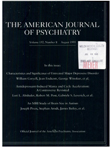Executive impairment among the functionally dependent: comparisons between schizophrenic and elderly subjects
Abstract
OBJECTIVE: Executive deficits have traditionally been associated with frontal lobe brain damage. They are relevant to a variety of disabling mental conditions, including schizophrenia and Alzheimer's disease. To measure these deficits, the authors developed the Executive Interview, a 25-item, 15-minute interview. It has been validated among elderly subjects across a wide range of functional impairment. METHODS: Forty young, chronically ill schizophrenic residents of a state mental health facility and 104 elderly residents, representing three levels of care, of a comprehensive retirement community were tested with the Executive Interview and the Mini-Mental State. RESULTS: When age, gender, education, and number of prescribed medications were controlled, cognitive impairment on the Executive Interview and Mini-Mental State rose with level of care. The Executive Interview alone discriminated between subjects at each level of care, and it was more sensitive to cognitive impairment than the Mini-Mental State. Executive Interview scores correlated the strongest with level of care. Mini-Mental State scores, number of prescribed medications, and age also correlated significantly. Schizophrenic patients showed as much executive impairment on the Executive Interview as elderly subjects at the same level of care despite significant differences in age, sex, and neuroleptic use. Executive Interview and Mini-Mental State scores were highly correlated among the elderly but less so among the schizophrenic patients. Cross-group differences were also found in the pattern of failure on selected Executive Interview items despite similar total Executive Interview scores. CONCLUSIONS: Increasing executive dyscontrol is associated with the need for increasing levels of care and supervision. This finding is neither age nor disease specific. Cross-group differences on selected Executive Interview items suggest the existence of disease-specific patterns of failure. Their recognition could prove useful in the identification of anatomically or pathophysiologically distinct subgroups among patients with executive dyscontrol.
Access content
To read the fulltext, please use one of the options below to sign in or purchase access.- Personal login
- Institutional Login
- Sign in via OpenAthens
- Register for access
-
Please login/register if you wish to pair your device and check access availability.
Not a subscriber?
PsychiatryOnline subscription options offer access to the DSM-5 library, books, journals, CME, and patient resources. This all-in-one virtual library provides psychiatrists and mental health professionals with key resources for diagnosis, treatment, research, and professional development.
Need more help? PsychiatryOnline Customer Service may be reached by emailing [email protected] or by calling 800-368-5777 (in the U.S.) or 703-907-7322 (outside the U.S.).



